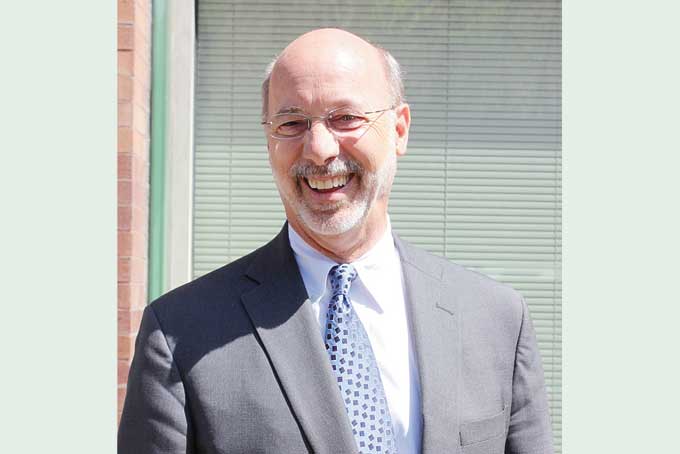
Though a famous writer with almost the same name once said you can’t go home again, Tom Wolf did—twice. The first time, eschewing a career in academia, the second time curtailing a run for Pennsylvania governor.
Both times, he went home to York County to take the family cabinet manufacturing business to new heights of success. Now, with major Democrats from across the state lining up to endorse his Primary Election run, Wolf is finding success in a second race for the governor’s seat.
Not bad, he told the New Pittsburgh Courier Editorial Board April 21, for a guy who dropped out of college to join the Peace Corps.
“Yeah, when I first started this people would say, hey, I think you’re a nice guy, but I’m not returning your call because I don’t think you can do this,” he said. “Now they’re returning my call. I think they like my story.”
Wolf said he knew U.S. Rep. Dan Frankel, D-Pa., whose endorsement he had just received, from contributing to Democratic races years ago when Frankel headed that effort. State Rep. Jake Wheatley, D-East Liberty, Wolf knew from his stint as Secretary of Revenue under former Gov. Ed Rendell.
“But a lot of them I hadn’t met,” he said. “I don’t know (Allegheny County Executive) Rich Fitzgerald. I didn’t know (U.S. Rep.) Mike Doyle, or (state Rep.) Ed Gainey.”
As a businessman, as a public servant and as a citizen, Wolf said he tries to live by ideals that Democrats traditionally espouse but often fail to realize. Of these, fairness and shared responsibility dominated his talk with the Courier–from tax policy to school funding to high Black prison population, to minority contracting, Wolf said none of that is fair in Pennsylvania and he has ideas to change that.
He would remove the current impact fee on Marcellus Shale operators in favor of 5-percent extraction tax. Over the life of a well, it would cost the companies very little more and would return much more revenue to the state.
Though he would not, he said, require any specific portion of it be dedicated to the affected communities–as the impact fee is–or only to fund education. He would put it in the general fund.
“I think it’s time to trust our elected representatives again,” he said. “I’d have 20 percent of it go back to the localities, I’d have some go to the (Department of Environmental Protection) because it’s so understaffed that businesses have to wait for routine approvals. I’d earmark some for R&D into clean energy, and that would still leave hundreds of millions for education.”
But, that is only one part of Wolf’s education funding plan, the other part involves increasing the state’s allocation to districts so people are not taxed out of their homes and communities aren’t left with progressively fewer homeowners paying progressively higher rates.
“The Republicans favor doing this via sales tax, but based on what I saw as revenue secretary, I would use the income tax,” he said. “It would be progressive in the sense that wealthier people would pay more, but with a universal exemption of $30,000.”
As an example, and stressing, “this is not the rate,” if the income tax rate were increased to 5 percent with the exemption, from its present 3.07 percent, then someone making $40,000 would only be taxed on $10,000. So that person’s effective rate is 1.25 percent, a significant reduction.
“People with incomes less than $30,000 pay nothing and the very high earners pay closer to the full 5 percent,” he said. “Now, there is a chance it would not pass constitutional muster because it says ‘all taxes shall be uniform,’ but I think it would because the rate’s the same.”
He would also reduce the state’s 9.9 percent business tax because potential new business owners get sticker shock, he said.
“A Republican friend one day was complaining about paying that tax and asking how others did it. I told him–they don’t,” Wolf said. “They’ve lobbied for exemptions and they don’t pay it at all. If we can get everyone to pay, we can lower the rate a lot. True story: When I was in Harrisburg, there was a line item in the budget to pay for a consulting firm that told incoming businesses how to avoid the 9.9 percent tax.
Could he get support from house Democrats if he cut it to 6 percent?
“No, but I could get it if I cut it to 3 percent. Could you see that headline in the Wall Street Journal: PA cuts business taxes 60 percent?”
Again, Wolf said, it’s about fairness. He would decriminalize marijuana possession and eliminate mandatory sentences for non-violent crimes. Though he admits not having read current proposed legislation, he favors “second chances” for ex-offenders.
“I do that at my company, and I also return 20-30 percent of the profits to my employees. People might say that’s about fairness, and it is—but it’s also smart business,” he said. “My chief technology officer is African-American, so is my chief financial officer. He runs rings around me with numbers, and I was secretary of revenue.”
Wolf said all of his policy proscriptions from education to tax policy could increase opportunities for poor and minority residents across the state
“I take my relationship with the Black community very seriously,” he said. “I was at a event in Philadelphia and someone asked me if I’d have a chief diversity officer in my cabinet. I said, I don’t think so. I’m going to be the chief diversity officer.”
(Send comments to cmorrow@newpittsburghcourier.com.)
Follow @NewPghCourier on Twitter https://twitter.com/NewPghCourier
Like us at https://www.facebook.com/pages/New-Pittsburgh-Courier/143866755628836?ref=hl
Download our mobile app at https://www.appshopper.com/news/new-pittsburgh-courier